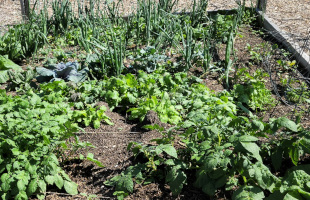Fertilizer is safe when used properly. If used improperly, however, it can have serious negative effects upon you, your plants, and the environment. Some of these effects are quite unintentional. I remember when they banned phosphorus in detergents because of algae blooms such as the one pictured below. The phosphorus went out into lakes and streams with the gray water from the washing machine and caused the algae to bloom. This then choked the water of sunlight and caused a fish kill.
Plant Nutrients Feed Algae
The same nutrients that are most used by plants when they are growing, nitrogen, phosphorus, potassium, sodium, zinc, iron, boron, magnesium, calcium, and chlorine, are the very ones that cause the most problems with excessive algae growth when washed into lakes and ponds. That means fertilizers that help plants grow on land can help algae grow too much in the water.
Agriculture Runoff Controlled
It used to be that most of this fertilizer came from industry — farms, ranches, wastewater treatment facilities, and similar places. However, laws were put into place, or actually enforced, that made it illegal for anyone to discharge fertilizer and other nutrients into the water. Farmers and ranchers have to have licenses to buy the quantities of fertilizers and pesticides they need and must attend continuing education on the safe handling of these substances.
Urban Problems
That system is not perfect, but it has made a difference. Currently, the major source of fertilizer and other problem substances in the water is urban lawns. When you put your fertilizer out before a rain so you won’t have to water it in, and it washes off into the stormwater, that fertilizer becomes part of the problem.
Fertilizer Safety Rules
Don’t be a pain in the watershed. Take precautions to make sure you do not contribute to the problem. These are simple things you should be doing anyway.
- Follow the label directions. More is not better.
- Do not apply fertilizer before an anticipated rain.
- Water fertilizer in as directed, but do not water to runoff.
- If tilling in fertilizer, till in so it is well mixed with the soil.
- Keep fertilizer in original containers in an area inaccessible to unauthorized individuals, especially children.
- It is best to keep fertilizers and pesticides in a locked cabinet or shed.
- Manure is a fertilizer and should be treated as such, although locking up the cow is probably excessive.
Follow these safety rules and you can avoid being a pain in the watershed. Your fertilizer should grow your garden, not algae.

Want to learn to garden? My first attempt at gardening ended up in failure. The weeds took over and squeezed the vegetables out. I was very frustrated by this waste of good seed, time, and money. So I became a master gardener and spent a lot of time helping other people avoid or overcome problems in their garden.
In order to help others garden successfully, I have written a book, Vegetable Gardening from the Ground Up, available in an ebook or a paperback from Amazon. It is also in Kindle Unlimited.



Really you have explained real anatomy of water pollution and its effects on water creature.
Very Nice article…The information which is provided is really helpful in farming. Thanks for the post and keep writing.
I just book marked your blog on Digg and StumbleUpon.I enjoy reading your posting. thank you very much.
That water really, really, really doesn’t look so tempting to drink.
At least I’d never drink it. Yuck! 🙂
/Nabil, from Sweden.
Well, some of our lakes that were used for city drinking water were looking like that, so extra chemicals had to be added to kill the algae. Made for nasty tasting water.
Nice article I enjoy reading your post, very good information.
Thanks
Algea bloom is a problem i Sweden too.
/Magnus